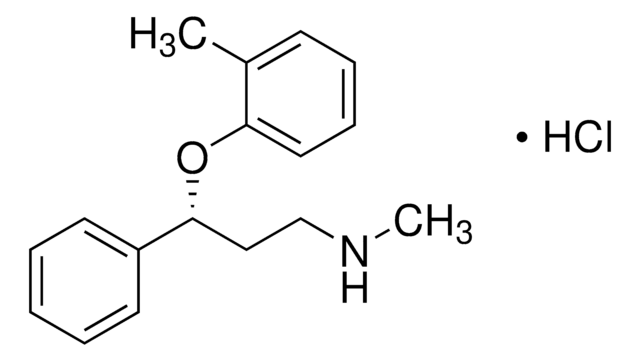T7947
(R)-Tomoxetine hydrochloride
solid
Synonyme(s) :
(R)-N-Methyl-γ-(2-methylphenoxy)benzenepropanamine hydrochloride, Atomoxetine hydrochloride
About This Item
Produits recommandés
Forme
solid
Niveau de qualité
Auteur
Eli Lilly
Température de stockage
2-8°C
Chaîne SMILES
CNCC[C@@H](OC1=CC=CC=C1C)C2=CC=CC=C2.[H]Cl
InChI
1S/C17H21NO.ClH/c1-14-8-6-7-11-16(14)19-17(12-13-18-2)15-9-4-3-5-10-15;/h3-11,17-18H,12-13H2,1-2H3;1H/t17-;/m1./s1
Clé InChI
LUCXVPAZUDVVBT-UNTBIKODSA-N
Informations sur le gène
human ... SLC6A2(6530)
Vous recherchez des produits similaires ? Visite Guide de comparaison des produits
Application
- to study the role of L-threo-3,4-dihydroxyphenylserine (L-DOPS) in the pathogenesis of Alzheimer′s disease in mice
- to study its effects on set shifting in rats
- to study its effects on rat brain as a result of its long-term use
Actions biochimiques/physiologiques
Caractéristiques et avantages
Code de la classe de stockage
11 - Combustible Solids
Classe de danger pour l'eau (WGK)
WGK 3
Point d'éclair (°F)
Not applicable
Point d'éclair (°C)
Not applicable
Équipement de protection individuelle
Eyeshields, Gloves, type N95 (US)
Certificats d'analyse (COA)
Recherchez un Certificats d'analyse (COA) en saisissant le numéro de lot du produit. Les numéros de lot figurent sur l'étiquette du produit après les mots "Lot" ou "Batch".
Déjà en possession de ce produit ?
Retrouvez la documentation relative aux produits que vous avez récemment achetés dans la Bibliothèque de documents.
Notre équipe de scientifiques dispose d'une expérience dans tous les secteurs de la recherche, notamment en sciences de la vie, science des matériaux, synthèse chimique, chromatographie, analyse et dans de nombreux autres domaines..
Contacter notre Service technique






